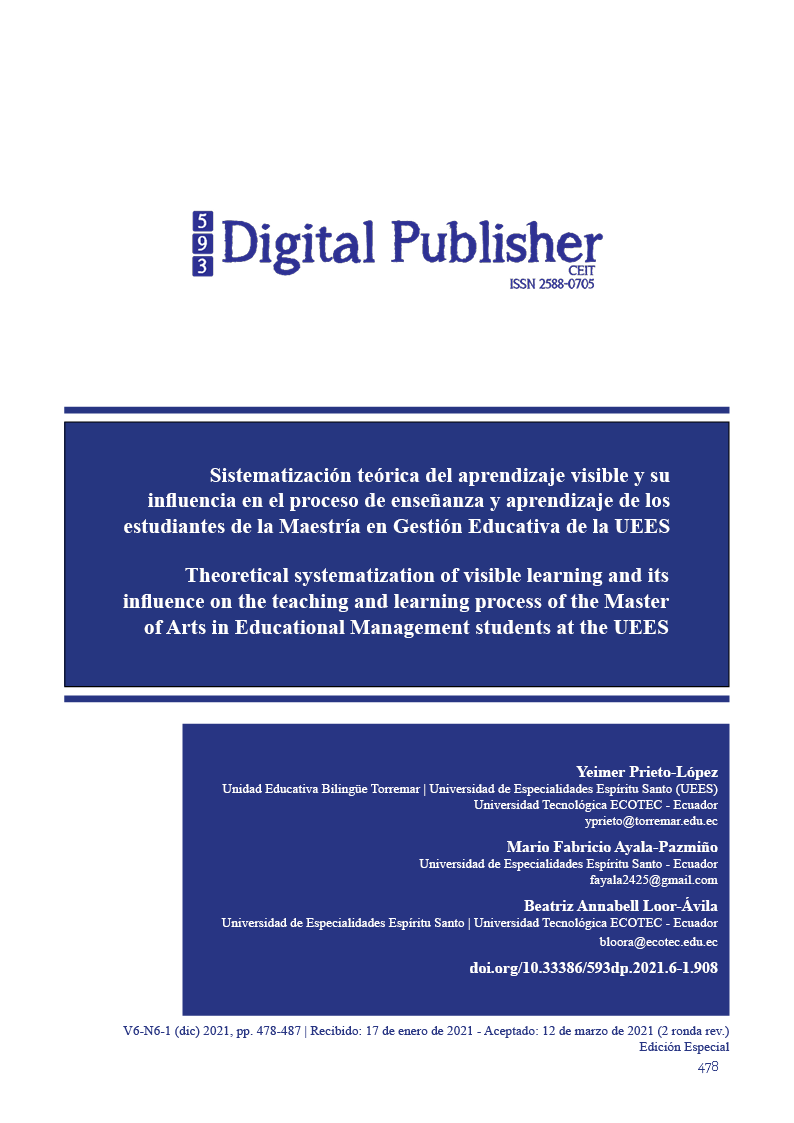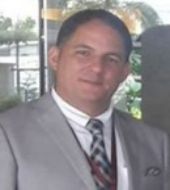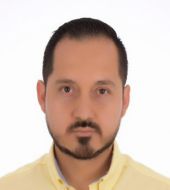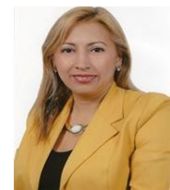Sistematización teórica del aprendizaje visible y su influencia en el proceso de enseñanza y aprendizaje de los estudiantes de la Maestría en Gestión Educativa de la UEES
Contenido principal del artículo
Resumen
El objetivo de los procesos de enseñanza y aprendizaje es que el alumno llegue a la fase de transferencia de conocimientos, en la que puede transferir a otros lo que ha aprendido en el aula. Sin embargo, para que el alumno alcance la meta, es necesario empezar por el principio, lo que implica comenzar con el aprendizaje visible. El aprendizaje visible es el enfoque directo para alcanzar nuevos conocimientos y es necesario para pasar a la fase de aprendizaje profundo.
Para este proceso se utilizaron varios métodos científicos, como la sistematización teórica, el análisis y la síntesis, y la revisión bibliográfica, teniendo en cuenta que se trata de una investigación de revisión académica.
Los estudiantes deben poder encontrar un profesor con el que puedan desarrollar una relación estrecha y dinámica, que conozca lo que enseña y cómo lo enseña, y que pueda evaluar el impacto que sus prácticas tienen en el aprendizaje visible y profundo de sus alumnos. Este artículo pretende proporcionar a los profesores los principales fundamentos teóricos y metodológicos y la sistematización de estrategias para medir este impacto y ajustar su evolución para conseguir mejores resultados científicos y académicos.
Descargas
Detalles del artículo

Esta obra está bajo una licencia internacional Creative Commons Atribución-NoComercial-CompartirIgual 4.0.
1. Derechos de autor
Las obras que se publican en 593 Digital Publisher CEIT están sujetas a los siguientes términos:
1.1. 593 Digital Publisher CEIT, conserva los derechos patrimoniales (copyright) de las obras publicadas, favorece y permite la reutilización de las mismas bajo la licencia Licencia Creative Commons 4.0 de Reconocimiento-NoComercial-CompartirIgual 4.0, por lo cual se pueden copiar, usar, difundir, transmitir y exponer públicamente, siempre que:
1.1.a. Se cite la autoría y fuente original de su publicación (revista, editorial, URL).
1.1.b. No se usen para fines comerciales u onerosos.
1.1.c. Se mencione la existencia y especificaciones de esta licencia de uso.
Citas
Andersen, G.G. (2018). Teacher perceptions of a culture of thinking. Advanced Education Programs Faculty Publications, 3, https://scholars.fhsu.edu/aep_facpubs/3.
Ayala-Pazmino, M., & Prieto-Lopez, Y. (2021). La pedagogía de la enseñanza del pensamiento: Hacer visible el pensamiento. 593 Digital Publisher CEIT, 6(4), 177-183. https://doi.org/10.33386/593dp.2021.4.517
Dajani, M.M.J. (2016). Using thinking routines as a pedagogy for teaching English as a second language in Palestine. Journal of Educational Research and Practice, 6(1), 1-18. 10.5590/JERAP.2016.06.1.01.
Golding, C. (2011). Educating for critical thinking: thought‐encouraging questions in a community of inquiry. Higher Education Research & Development, 30(3), 357-370. 10.1080/07294360.2010.499144
Hattie, J. (2018). Visible learning: A synthesis of over 800 meta-analyses relating to achievement: Routledge.
Marzano, R. J., & Heflebower, T. (2010). Formative assessment & standards-based
grading: Solution Tree.
Paul, R. (1993). Critical thinking: What every person needs to survive in a rapidly changing world. Rohnert Park, CA: Center for Critical Thinking and Moral Critique, Sonoma State University.
Perkins, D. (2020). Un aula para pensar: Aprender y enseñar en una cultura del pensamiento. Buenos Aires. Aique.
Peterson, J.J. (2021). Visible thinking: A distributed cognitive process to self-manage cognitive load. United States Army Research Institute for the Behavioral and Social Sciences. https://apps.dtic.mil/sti/pdfs/AD1124593.pdf.
Ritchhart, R. (2015). Creating cultures of thinking. The 8 forces we must master to truly transform our schools. California: Jossey-Bass.
Schön, D. A. (1988). El profesional reflexivo: cómo piensan los profesionales cuando
actúan: Paidos, Barcelona: P. imprenta.




